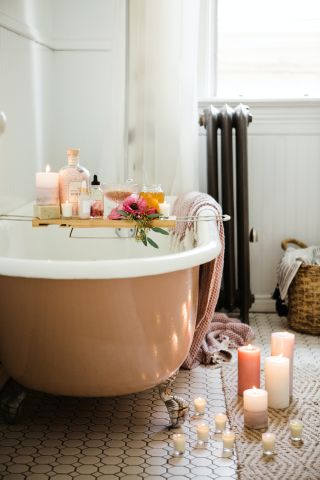Resilience
True Emotional Resilience Requires True Self-Care
How true self-care improves your emotional wellbeing.
Posted May 10, 2023 Reviewed by Devon Frye
Key points
- Understanding anxiety styles can facilitate stress reduction.
- True self-care provides lasting positive benefits.
- True self-care is unique for everyone.
- Replacing surface self-care with true self-care can improve mental health.

Have you ever taken the time (and spent the money) to get a lovely massage or take an incredible vacation, only to come home feeling even more stressed than when you left? Those feelings of relaxation and calm you experienced during your “break” were wonderful. Yet the benefits seem to disappear in the blink of an eye. Suddenly, you’re in an argument with your partner or overwhelmed by the number of emails in your inbox!
This often happens when people confuse true self-care with surface self-care. It’s incredibly easy to do. Nobody teaches us the difference between the two. “True” self-care differs for everyone, so it can easily become hazy and confusing. Only you can determine what is true self-care for yourself.
True self-care is any activity or practice that creates joy and increases levels in your emotional bank account. It refuels you. Further, it doesn’t always look like some sort of luxurious experience.
In my new book, The Unflustered Mom, I outline a framework of five anxiety styles. These styles are based on our core emotional drivers and trigger points. Individuals with these five styles (what I call Lovers, Fighters, Dynamos, Executives, and Visionaries) are triggered by different things and refuel their emotional bank accounts in distinct ways.
For instance, those with the Dynamo anxiety style feel most refueled when they take time to accomplish or make significant progress on a project that is very important to them. When they do this, they are much less irritable and significantly less flusterable for the remainder of the day.
For Lovers, true self-care might look like a hike with their best friend, a romantic dinner with their partner, or a long talk on the phone with their mother. Those with the Executive anxiety style might feel most emotionally replenished when they have the time and energy to clean, plan, and organize an important area of their life.
For Visionaries, true self-care might look like a retreat or workshop with other visionaries where they can connect and share their big plans for impacting the future. Fighters, on the other hand, may consider signing up for a sprint marathon or a weekend trip somewhere they’ve never been before as true self-care.
Have you returned home after a pedicure to find the house even more of a disaster and everyone arguing? That temporary calm and joy you felt during your foot massage immediately dissolved as soon as you stepped through the door, right?
That’s a great indication that your self-care was surface self-care. It’s easy to confuse surface self-care with true self-care because they both feel good in the moment.

With surface self-care, when it’s over, we often feel even more frustrated or irritable than we felt beforehand. Our assumption is that the pedicure filled our emotional bank account.
But it didn’t. It was nice while it lasted, but it only scraped the surface. It made us feel relaxed or excited or joyful only during the experience.
It also raised our expectation that we should feel better afterward. When we don’t feel better, our frustration is exacerbated. True self-care bolsters you in a much more profound way and the effects last much longer.
True self-care:
- Provides lasting effects which refuel you emotionally and physically longer than the time you’re actually doing the activity.
- Creates a deep positive shift when done regularly. It energizes and allows you to feel more relaxed, flexible, forgiving, appreciative, and compassionate with yourself and others.
- Becomes a habit easily. Because of the lasting effects and deep benefits, true self-care becomes self-reinforcing very quickly.
Surface self-care:
- Only feels great while you’re doing it. (In fact, it can actually lead you to feel less calm and more irritable in the long run.)
- May be an activity that is refueling to others, but not to you.
- Can feel more like an obligation. (Instead of a fun, interesting, or exciting activity.)
If you’re not sure what true self-care is for you…
- Ask Yourself: What is something you don’t do regularly (or at all), but when you’ve done it in the past, it made you feel excited and energized, and (most importantly) shifted the current challenges in your life from daunting to doable?
- Ask Yourself: What is an activity you used to do that you loved, but stopped doing because of life responsibilities, changes in circumstances, or a false belief that you’re too old or too out of shape?
Now, take a moment and jot down two or three true self-care activities that work for you.
Do you feel deeply refueled when you go to the beach by yourself for an hour? This might indicate a Visionary anxiety style. Do you feel deeply refueled when you have time to plan out the month ahead in detail, with no interruptions? This could mean you lean toward an Executive anxiety style.
Do you feel deeply refueled when you go for a long run in the hills with your best friend? This might mean you have a Lover anxiety study. Do you feel deeply refueled when you clear a Saturday afternoon to work on a passion project? You might have a Dynamo anxiety study. And if you feel deeply refueled when you participate in a protest march, you might be a Fighter.

True self-care requires tuning into what fundamentally drives you; understand what types of activities leave you feeling a burst of energy—a high, so to speak. When you spend more time in these types of activities, you raise your baseline level of emotional resiliency. And, increased emotional resiliency means you’re less likely to remain anxious, agitated, impatient, frustrated, or flustered.
You deserve to be in control of your own emotional well-being. Only you can know what is best for you. Stressors and challenges will always come into your life. Knowing the tools and strategies that work best for your unique anxiety style will make all the difference. When you have the tools to increase your emotional bank account, you can become more emotionally resilient.
Want to know your anxiety style? Take the quiz.




